- Getting around Lijiang. Dont stay in the Old Towns more than 2 days, there is nothing to do. KRISS Oct 9, 2013 05:46
- 2013 Beijing Temple Fair BENNYLAU Feb 26, 2013 03:29
- Malaysian traveling from KUL - LAX vis Shanghai PVG ZATI_DY Jan 3, 2013 20:15
Island of Sunbeams and Salty Air: Dongji
- Views: 6721
- |Vote: 0 0
- |Add to Favorites
- |Recommend to Friends
The most famous of the islands off the coast of Zhejiang Province is Putuoshan, an island of remarkable beauty, pale golden sands and Buddhist temples. Or so I’m led to believe, for I haven’t been there but I have just passed the island, its 33metre tall Guanyin statue beaming peace and serenity over the ocean like a golden lighthouse, and it does look heavenly.
I am on the ferry to an island group that is far less frequented, little known and more difficult to arrive at – and that’s the attraction. Dongji is an archipelago of islands, four of which are inhabited, that lie some 3 hours out to sea, east of Zhejiang Province. Foreigners require an Alien’s Travel Permit to get there, something I was unaware of until I went to catch the ferry and the woman produced an English sign telling me I couldn’t buy a ticket without one.
Now, a day later than scheduled, looking out on the endless expanse of mid-blue ocean and sky, I am feeling a little queasy. The embrace of the silent swells, and a man inside who refuses to obey either the no-smoking signs or the vague warning of the nonchalant attendant, have left me no choice but to stand on deck in the open air. The sun is dazzling and the cloudless sky and ocean are of such a similar hue that I feel as though we’re undulating in a blue tunnel.
What an adventure though! The islands of Dongji are somewhere out there, going about their quiet and unassuming business, and I am only a couple of hours away.
The late morning arrival of the Zhoushan ferry is the single biggest event of the day in the lives of Dongji Town residents. As such, a welcoming committee complete with said umbrellas, is assembled on the wharf. They aren’t here to welcome people as much as cargo, and on immediate docking, the unloading begins of rice, pot noodles, beer and other essential items.
A few locals approach me through the melee offering me a place to stay and I accept the invitation of tiny woman with a bright smile. She leads me up a winding stone staircase and I feel as though I’m treading through a movie set of fairytale stone houses set against the craggy rocks. The basement is dark and deliciously cool, but on ascending the stairs I am greeted with an astonishing sea view through stone arches and, imagining dinner that night overlooking the ocean, I’ve already made my decision to stay.
My bedroom is less than basic, containing 5 beds, a set of drawers and a single fan, but the newly completed bathroom downstairs has hot water, a shower and a western-style toilet. The woman also turns out to have a husband who works as a fisherman, and a young son, who after conquering his initial shyness will become my shadow for time here.
The woman informs me, belatedly, that I need to register with the local “police” on the island and that I’m not technically allowed to stay with her – but that it’s up to me.
“It’s for your own safety,” the bemused local-police-stroke-army-officer tells me. I can tell he’s not used to answering questions and I don’t understand why a hotel is any more safe than a local family’s home.
The office is located in an old walled courtyard and it’s like being back at school. I might be the only work the five officials have had to do all day, and they survey me with interest from the safety of a Perspex screen. They slowly and deliberately fill out the forms, passing my passport around and scrutinizing the battered piece of paper that is my “Alien’s Travel Permit” as if for evidence of forgery. Everything is in order of course, and the officer smiles at me when he tells me that I am only allowed to stay in the island’s official hotel. When I cheekily suggest to him that this is simply to make money from me, the hotel rooms being more expensive than staying with a local family, he gets serious.
“What if your things get stolen? What if something happens?” he asks me earnestly.
“Then it would be my own choice, my own fault...”
I stubbornly protest for a while, I’m not sure why. The officer is starting to look like he’d throw me off the island if only the ferry hadn’t already left, and this I do understand. I shut up, deciding on acquiescence and reminding myself that this is China and he really is obliged to be my “keeper”. I nod soberly to his repeated instructions – stay at the hotel for 1 night, leave on the 10th July – and he hands me the paperwork.
As I leave the office the young boy who must have followed me and has been hiding runs over to me, all skinny arms and legs, and grabs my hand: “Are you staying with us?” he asks.
I do suffer a momentary twinge of guilt, but trust that here as much as elsewhere in China, rules are primarily for show.
“Of course I am, let’s go!”
Temple Lake Island is tiny; an idyllic rock in the ocean, a thrown stone. There’s not a single tree, nor a cloud beyond a wisp of white, to offer shelter from the blazing summer heat. It’s possible to circumnavigate the island by foot in the space of an afternoon, and to explore the town in little more than the blink of an eye. Life here is in fact so slow, that you may feel as though you’re moving backwards. Like no-where else I’ve ever been, this is a place to sit on cobbled streets and open a bottle of beer; this is a time to experience living in slow-motion; this is a world where the fastest thing happening is the breaking of a smile.
I take a late afternoon stroll around half of the island, following the only path that winds up behind the town. Pampas grass abounds, its fluffy heads atop metre-tall stalks and thick dwarf pines stubble the slopes. Aside from the scuffling of the wind through the grass and the barest hum of an engine, its silent.
White cobblestone paths crisscross the hills and snake between the flares of pampas. You can wander down to old deserted settlements, secluded rocky headlands and even discover the pale stone tombs of residents long gone and laid to rest in surroundings of imperial splendour: amidst cliff top boulders, emerald grasses and ocean views.
The walk also offers unobscured views of the neighbouring islands, the cobalt blue ocean and a puff of cloud on the horizon. One of those islands is called Qingbang, and is a 20 minute boat ride from Dongji. Its quietness equal to its little known place in history: in 1942 its inhabitants rescued a group of British POWs who had escaped from a sinking Japanese ship.
Today the only thing floating in the waters are the fishing boats, with their blue-painted wooden bodies and brilliant red flags: moored in clusters or chugging out alone. Fishing is the mainstay of the town, and the husbands of the island are up before sunrise and by around lunchtime the fresh catch (primarily crabs, shellfish, Groupers, Yellow Croakers and Tigerhead fish) is being brought to shore to be prepared by their wives.
An early afternoon stroll through the streets will find the women sat at long wooden tables, expertly preparing the fish. Later they will lay them out in the sun to dry on large frames coated with wire mesh. A salty tang fills the air and the cobblestones are shimmering with the discarded glitter of a hundred thousand fish scales.
The women of the island are also its artists and from the moment you step onto the rocky wharf, you will notice that the outer walls and brickwork are decorated with large square paintings. None of the women are “trained” artists, yet their work has a powerful appeal with its naive, abstract style, and its luminous colours. The subject matter is primarily island life, the bounty of the seas and fishing culture.
The paintings are a folk art unique to the island, and their production now helps with the tourist revenue: you can buy the paintings themselves, or T-shirts and coasters of the images.
Exploring Dongji Town is like taking a trip back in time, or walking through a fable. It clings to the rocky headland with stone walls and narrow cobbled streets that have never seen cars. The houses rise upwards one, two, three stories and are accessible by a convoluted maze of steps and staircases.
As I move towards the interior of the island, the land becomes flatter and some of the houses have the luxury of a garden. Butterflies play amongst the tropical red cannas and the gregarious pink pelargoniums and it’s easy to see the inspiration for the vibrant colours of the island art.
Level ground is at a premium on this rocky land and vegetable patches are rare. Where they exist, the canny islanders have maximised the space and crammed in tall sweet corn plants, with squashes at their feet, and gourds and climbing beans overhead.
The pleasant evening is welcomed on Dongji, and out into the coolness come the sounds of island life; first the chopping of vegetables, then the hiss and snap of wok and flame. The clattering of pottery to my makeshift dinner spot on the balcony heralds the arrival of a seafood feast: freshly steamed crabs, a plate of shellfish and the island’s Tigerhead fish, fried with a little garlic, chilli and chives. Soy sauce and brown vinegar for dips and a bowl of white rice complete the delicious fare.
I eat in an almost Mediterranean setting, overlooking the ocean, listening to the clinking glasses and laughter of baijiu-influenced suppers and hearing the slap of the waves against the wharf. I’ve not long finished when my young friend comes to join me, fascinated by my camera and we converse in choppy Chinese – I as baffled by his accent as he is by mine. There are few other children on the island and the arrival of anyone new is a cause to chatter at length about such weighty topics as who would win in a fight between Ultraman and The Monkey King.
Nightfall in Dongji is just that, the closing of the curtain on the day, the arrival of darkness. A single star comes out, then a hundred, and before I know it a thousand, and the crescent moon is a silver smile, the boats bob and the waves whisper – who says it’s uneventful?
The locals cluster in small groups to play mahjong, or watch mahjong being played and offer appraisals. Muted music sounds from somewhere, perhaps the one tiny bar, and couples stroll along the barely lit wharf.
I wander a while with my young friend, spotting the winking lighthouses and enjoying the relative cool, but with a 3am alarm call tomorrow morning, I head back for an early night – much to his disappointment. He retires to watch cartoons on TV and I return to “my” room. Like Goldilocks, I test out each of the 5 beds but they are all as hard as the island’s rock. I use the duvet as a mattress, it’s way too hot for a cover anyway, and with the mosquitoes gathering I switch on the feeble fan and turn out the light.
It’s suggested that these islands see the sunrise earlier than any other place in China, I have no idea if it’s true, but at 3am I’m wishing it wasn’t. I’m tempted to turn over and go back to sleep, until the smell of the ocean reminds me where I am.
Half an hour later and I’m in place, an intermittent breeze blows and when it does it’s even a little chilly. I have a long, if picturesque, wait sat in the silence of a white stone pagoda, as the morning reclaims the sky and the stars disappear. The sun doesn’t become visible until 4.59am, although from as early as 4.30am the sky begins to lighten. I watch the morning break in pale pink over a sea as flat and pale as a puddle of spilled milk. The pink deepens, tinged with yellow streaks before burning to molten gold as the orangey-red arc of the sun finally appears.
The fishermen of course have seen it all before, and I watch a couple descend the steep steps down to the sheltered cove on the eastern side of the island. A small wooden boat turns at their call and picks them up from the shore to ferry them to the moored fishing boats.
For me, the morning is bittersweet, for it means I will soon leave Dongji Town and its gentle rhythms with nothing but a wish for just a little more time.
Waiting for the ferry to arrive, I watch a boat scooping up the seaweed that collects in great swirling slicks of fluorescent green. Caught up in its tendrils is a vast amount of rubbish, from polystyrene and plastic bottles to banana skins. The islanders, day in day out, fish out tonnes of weed and pile it in hills on the wharf. It is then separated from its snagged debris, dried and used for cooking, for the garden and for numerous other purposes.
And suddenly the ferry is here and I’m watching Dongji Town grow smaller from its churning wake. My eyes fix on the island’s statue: a man, standing bold, and holding aloft a flaming torch. He is a local hero around Dongji, a fisherman, and his pale stone figure symbolises life here as surely as Guanyin represents Putuoshan. I see him and the island he watches over diminish, until they are but a thin line on the horizon and then nothing.
Information (July 2008)
Dongji and its surrounding islands are remote and very little English is spoken, so make sure that you either speak Chinese, prepare well or have a Chinese speaking friend with you.
My information regards reaching Dongji from Zhejiang Province, but it is also accessible from Shanghai.
Be aware that Dongji东极is the name of the archipelago of islands. The main town is Dongji Township东极镇 and is located on Temple Lake Island 庙子湖岛. Your ticket however will simply refer to your destination as Dongji 东极.
Getting There:
From: Ningbo South Bus Station 宁波南站
To: Shenjiamen on Zhoushan Island, 沈家门,舟山
Time: 2 hours
Cost: 41RMB per person
Note: Journey includes ½ hour ferry crossing across to Zhoushan
From: Shenjiamen沈家门
To: Dongji 东极
Time: 2-3 hours
Cost: 70RMB for a seat (you can pay 10RMB extra for a bed, but there’s no need)
The ferry leaves from Banshendong Harbour 半升洞 码头 in Shenjiamen
Daily at 8.15am
Tickets are bought at the harbour entrance and if you’re not Chinese you must have an Alien’s Travel Permit (外国人旅行证) or you will not even be allowed to buy a ticket.
Getting Back:
The same ferry takes passengers back at approximately 12 noon daily.
Tickets can be bought from the Tourist Office on the wharf.
Getting an Alien’s Travel Permit (外国人旅行证)
The permit is available from a small office adjoining the Police Station, next to the People’s Hospital 人民医院 in Shenjiamen.
Address: 85 Gongxia Road, near Taishi Road, 宫下路85号,近太师路
The local taxi drivers know where to go.
Cost: 50RMB
Opening Hours: 8.30am – 11am (Monday to Friday)
The staff didn’t speak English when I was there, but the form is in English and Chinese. You will need to show your passport, and leave a copy of it with them. It may also help to have written in Chinese characters what you are doing in China (ie: travelling or working etc)
Accommodation:
You can stay at the island hotel, rooms start at around 200RMB for a night.
You can take a chance and stay with a local family, check the rooms first, and prices start from 60RMB upwards per person. Local families will also cook breakfast, lunch and dinner for an additional price which you can negotiate with them.
Things to do:
Boat trips to neighbouring islands and fishing trips, or hiring fishing equipment, can all be arranged from the Tourist Office. The local family you are staying with may also offer you a trip with them if you’re lucky.
Note: There are no banks on the island, so make sure you take enough cash.
Finally, those interested in the British POW story of the Lisbon Maru, might like to look at the following sites for more information:
http://www.bbc.co.uk/ww2peopleswar/stories/96/a4103696.shtml
http://www.lisbonmaru.com/



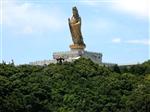
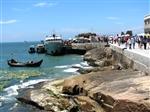
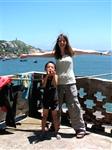
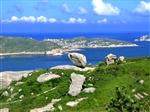
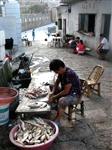
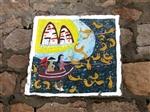
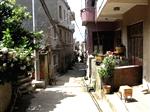
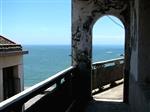
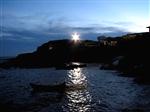
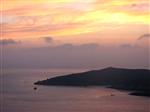
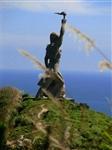
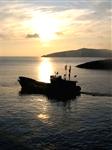
 Copyright © 1998-2026 All rights reserved.
Copyright © 1998-2026 All rights reserved.
1.
May 11, 2022 12:25 Reply
Ms.TERRY RUSTAN from United States said:
Do you know who I could contract concerning purchasing some of the fishermen folk art created on Dongji Island? I used to live in China and visited Dongji -- a magical place. Any suggestions appreciated.
2.
Aug 21, 2013 22:37 Reply
Ms.LAYLAY from China said:
Also how do i find locals to stay with? should I not book a hotel and just go there?
3.
Aug 21, 2013 22:12 Reply
Ms.LAYLAY from China said:
Thanks for the detailed review. I currently live in Ningo. Will my F visa not work for this trip?